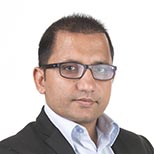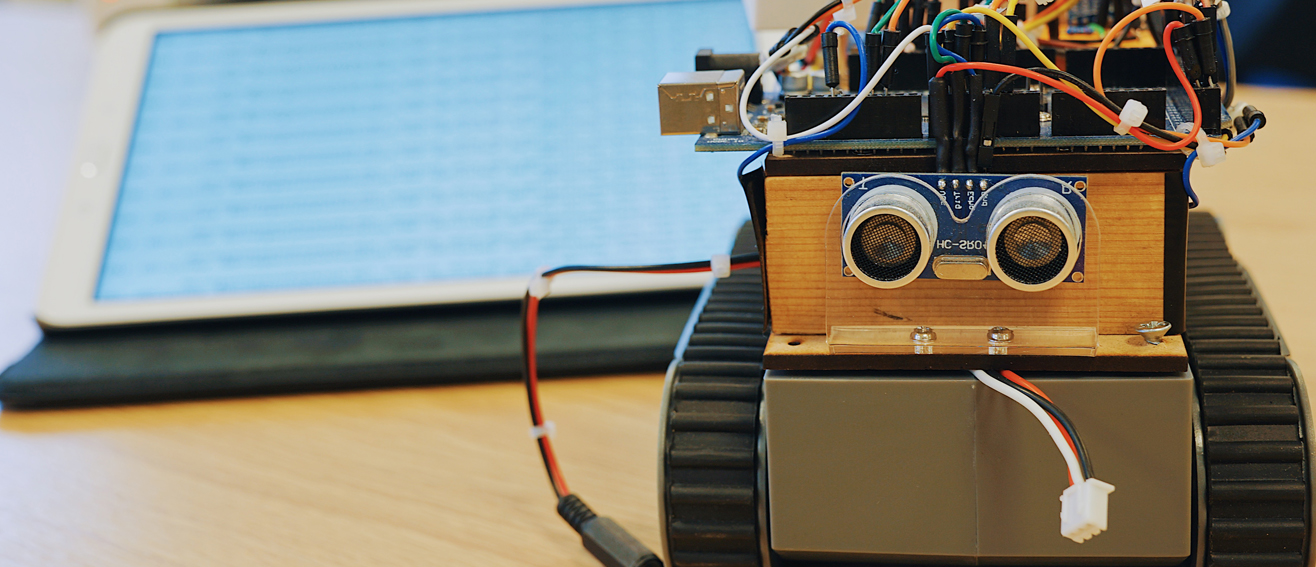
Cognitive Systems Research Centre
The cognitive Systems Research Centre (CSRC) specialises in the field of engineering cognition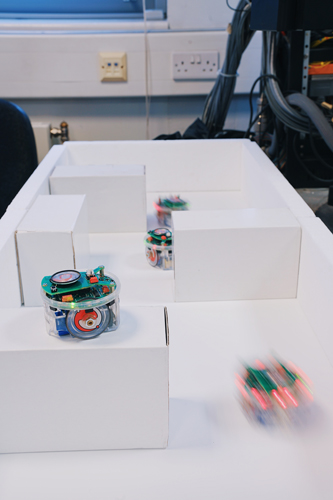 Terms of Reference
Terms of Reference
The Cognitive Systems Research Centre (CSRC) specializes in the field of engineering cognition, where the physical world is integrated, converged, and interacts with cyber-physical and computational systems. Technologies related to cognitive systems are transforming the way people interact with engineered systems. The Centre works at the following cutting-edge technologies: 5G and 6G, edge cloud, multimodal IoT systems, autonomous robots, control, big data, AI, and decision support systems.
The Centre carries out fundamental and applied research in emerging and future areas of smart applications where the quality of life can be improved (e.g. smart cities, agriculture, and health) and sustainability and productivity can be enhanced (e.g. manufacturing, sustainable development, smart grid).
Cognitive Systems Research Centre is led by Prof. Tasos Dagiuklas.
Visit our Twitter Page
Objectives:
- Establish collaboration in Cognitive systems research among academic staff, researchers, and (under)/(post)graduate students in the university
- Establish collaborative links with national and international higher education, research institutions, and industry in areas of mutual interest.
- Increase access to related interdisciplinary activities throughout the university
- Work with industry and government bodies on cognitive systems important to the implementation of emerging and future technologies
- Establish a research environment for the design, development, testing, and evaluation of Cognitive Systems in emerging and future areas of science and technology
- Provide an opportunity for graduate and undergraduate students to work in a vibrant research environment
Videos about CSRC research
NVIDIA Gen-AI London meet up
Dr. Muddesar Iqbal, a distinguished researcher from LSBU's Cognitive Systems Research Centre (CSRC), took centre stage at the NVIDIA-sponsored GenAI meetup in London. This event, organized by NVIDIA Corp, provided a platform for industry leaders and academics to showcase their latest advancements in cutting-edge technologies and engage in discussions regarding the opportunities and challenges brought forth by Generative AI (GenAI) in Europe.
During a notable interview with NVIDIA, Dr. Iqbal elucidated on the potential of leveraging quantum computing processing power within the framework of 6G networks to revolutionize the future AI industry. The meetup also addressed several other pivotal topics in the realm of AI and technology.
Video Analytics using AI on the edge
This video demonstrates how to face detection can be done to a video feed using AI on the edge.
VNF Migration
This video demonstrates how VNF instances are migrated among instances using decisions based on load prediction with Machine Learning.
QoE Web-Application
Quality of Experience Web-Application.
QoE Video Streaming
Quality of Experience Video Streaming.
The Knowledge Plane in SDN
The Knowledge Plane in SDN: Analytics API For Containers' Resources Utilization on the cloud.
Areas of Research
The centre will engage in the following areas of research
- Smart Internet Technologies
- Assistive and enabling systems
- Cognitive Human-Machine Interfaces and Interactions
- Cyber Physical Interaction
- Data Transformation using Artificial Intelligence and Machine Learning
- Distributed Autonomous Systems
- Human Sensing
- Interconnected Objects and M2M Communication
- Robotics and automation
Key facilities
Network Automation (CoRoS)
The Cognitive Routing System (CoRoS) is an SDN-Routing framework that leverages the centralized routing model for dynamic networks. The following figure depicts a reference communication model in the context of a battlefield scenario. The mobile end-devices (e.g., soldiers) connect with a switching node using a broadcast link like Wi-Fi, and the switching nodes connect using point-to-point links. The controller connects the switching nodes using a South-Bound interface to monitor and configure the underlying topology information.
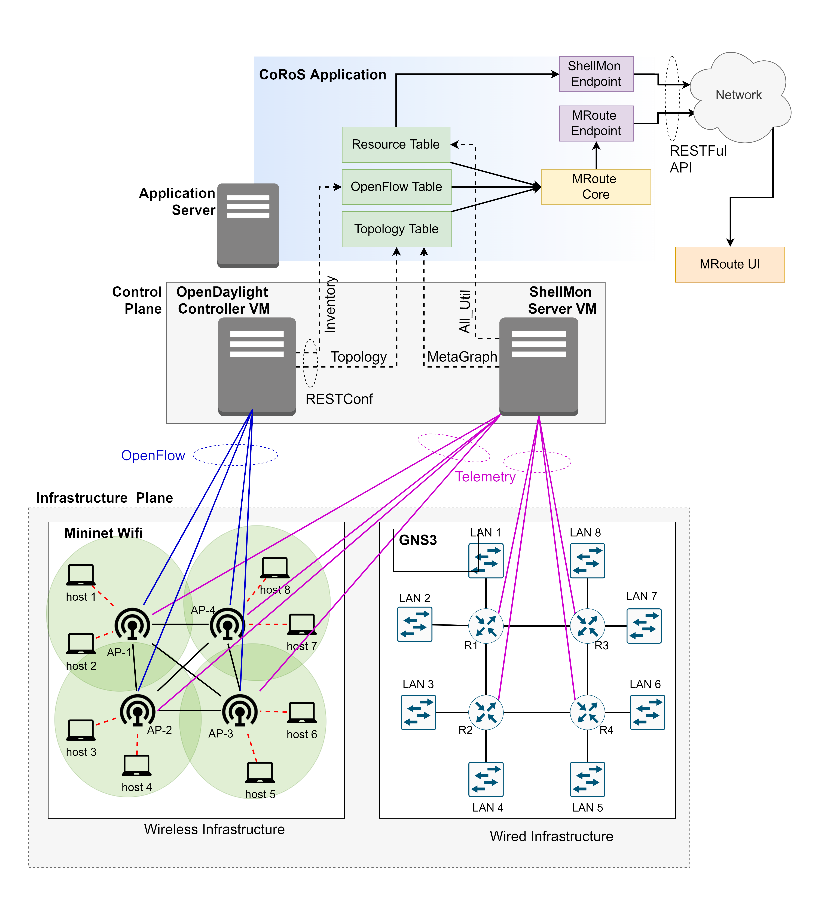
5G Self-organized Networks (SON)
A revelation in today´s mobile networks is SON (Self-Organizing technology) technology, which is seen as a playing pivotal role in reducing the management costs of networks. LSBU’s 5G SON testbed is capable of collecting information from the network, so as to perform self-configuration, self-optimization, self-healing and etc, so as to reduce the operation cost through less human involvement, and to optimize the service quality through robust and prompt network optimization.
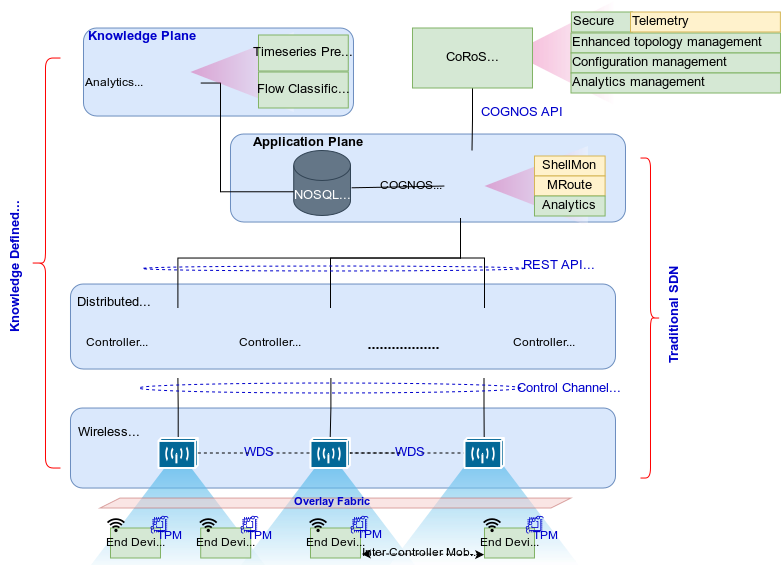
5G Positioning as a service
We have designed and implemented DEep Learning-based co-operaTive Architecture (DELTA). It uses machine learning model for positioning as a service through a 3D multi-layered fingerprint radiomap. This approach can be applied to use cases such as 3D indoor navigation in multi-floor smart factories or in large complex buildings.
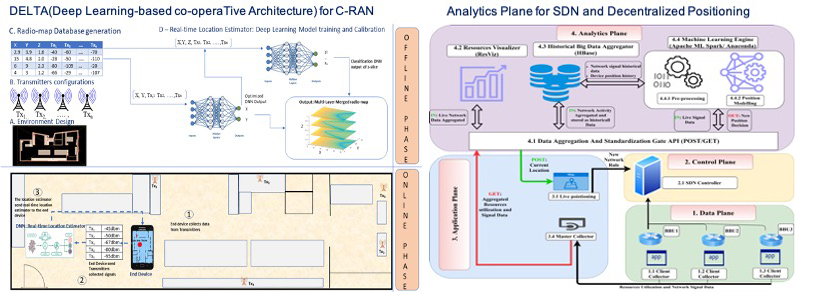
Technologies for Smart Cities
This Smart Cities research is funded by Innovate UK to distribute processing to the network edge as much as possible exploiting a new type of unified telecommunication and micro-data centre nodes able to jointly provide networking, local processing, and storage resources for the support of novel applications across users with heterogeneous capabilities. The WATCH platform brings a collaborative environment to a variety of sources and devices in a smart city domain.

The objective is to improve the provisioning of smart surveillance (object detection, object tracking, and face or text recognition) using edge computing from different types of cameras (for example, body-worn cameras, Smartphone cameras, city cameras, and car recorders), IoT devices and vehicles, generating media analytics. Future Intelligence Ltd, a leading SME, is already providing solutions for smart cities and smart lighting and markets. This project will expand its solution portfolio with new capabilities and new featured products and services. On the other hand, London Southbank University will expand its academic leadership in the advanced cloud infrastructures area.
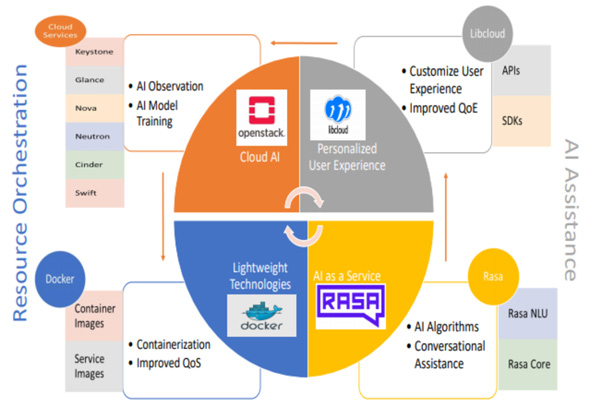 6G Technologies
6G Technologies
5G networks represent a variety of services infrastructures to transform current industries. However, 6G networks are expected to have a breakthrough by enabling a variety of cognitive-communication services in diverse environments. This calls for an establishment of a new and emerging domain for research that lives on the overlapping boundary of Communication Networks, AI, Machine Learning, and collaborative Psychology. Responding to this need, We have established a research domain in SuiTE Lab to proposed a concept of Collaborative Cognitive-Communication (3C) Systems, which contribute towards 6G standardization, opening new research dimensions involving human psychology patterns and the systemic-linking method to AI, Data Science, Social Collective Intelligence for applications such as holographic communication, self-driving vehicles, context-aware infrastructure and personalized interfaces to support industry 4.0 applications. We have implemented a proof of concept to demonstrate the technical capabilities of this novel concept to a Technology Readiness Level (TRL) 3, with the potential to produce a full TRL9 3C System in the future to support application areas for 6G technology.
Publications
Please click for more publications:
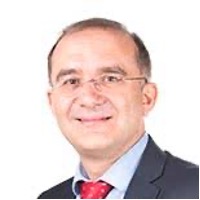 Professor Tasos Dagiuklas
Professor Tasos Dagiuklas
 Professor Mohammad Osman Tokhi
Professor Mohammad Osman Tokhi
Hadi, M., Darus, I.Z.M., Ab.Talib, M., Yatim, H.M. and Tokhi, M.O. (2021). Vibration suppression of the horizontal flexible plate using proportional–integral–derivative controller tuned by particle swarm optimization. Journal of Low Frequency Noise Vibration and Active Control.https://doi.org/10.1177/1461348420934636
 Dr Bugra Alkan
Dr Bugra Alkan
 Dr Oswaldo Cadenas
Dr Oswaldo Cadenas
Dr Daqing Chen
Li, B., Yang, Z.P., Chen, D.Q., Liang, S.Y. and Ma, H. (2020). Maneuvering target tracking of UAV based on MN-DDPG and transfer learning. Defence Technology. https://doi.org/10.1016/j.dt.2020.11.014
 Mike Child
Mike Child
Child, M, Rosner, P and Counsell, S (2019). A Comparison and Evaluation of Variants in the Coupling Between Objects Metric. Journal of Systems and Software. 151 (2019), pp. 120-132. https://doi.org/10.1016/j.jss.2019.02.020
Dr Fang Duan
Nafiah, F, Tokhi, MO, Shirkoohi, G, Duan, F, Zhao, Z, Asfis, G and Rudlin, J (2020). Parameter analysis of pulsed eddy current sensor using principal component analysis. IEEE Sensors Journal. https://doi.org/10.1109/JSEN.2020.3036967
Dr Muddear Iqbal
 Dr Shyamal Mondal
Dr Shyamal Mondal
Mondal, C. S. and Patricio L. C. M. (2020). A robot design for wind generator support structure inspection. CLAWAR 2020: 23rd International Conference on Climbing and Walking Robots and the Support Technologies for Mobile Machines. Moscow, Russian Federation 24 - 26 Aug 2020 CLAWAR Association. https://doi.org/10.13180/clawar.2020.24-26.08.id#
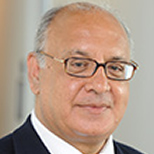 Professor Tariq Sattar
Professor Tariq Sattar
Santo, F., Sattar, T., Mba, D. and Edwards, G. (2019). Identification of Fatigue Damage Evaluation using Entropy of Acoustic Emission Waveform. SN Applied Sciences. 2 (138). https://doi.org/10.1007/s42452-019-1694-7
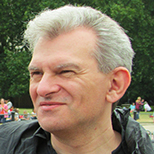 Dr Jon Selig
Dr Jon Selig
Bayril, D. and Selig, J. (2020). On Plane-Symmetric Rigid-Body Motions. Journal of Geometry. 111 (29). https://doi.org/10.1007/s00022-020-00543-6
 George Ubakanma
George Ubakanma
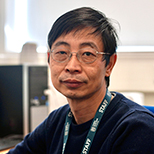 Dr Zhanfang Zhao
Dr Zhanfang Zhao
Nafiah, F, Tokhi, MO, Shirkoohi, G, Duan, F, Zhao, Z, Asfis, G and Rudlin, J (2020). Parameter analysis of pulsed eddy current sensor using principal component analysis. IEEE Sensors Journal. https://doi.org/10.1109/JSEN.2020.3036967
 Dr Yongxu Zhu
Dr Yongxu Zhu
Books
Kondoz, A. & Dagiuklas, T. (eds) (2017). Connected Media in the Future Internet Era, Springer
Partnerships for CSRC
The team draws on additional expertise and access to advanced research techniques by engaging with academic partners from other universities in the UK and oversees. Examples of our partnerships include:
- University of Malaysia, Malaysia – Research collaboration and joint PhD
- University Malaysia Pahang, Malaysia – Research collaboration
- University Technology MARA, Malaysia – Research visit and collaboration
- University Technology Malaysia, Malaysia – Research visit and collaboration, Joint PhD
- Nanyang Technological University, Singapore – Research visit and collaboration
- Shifa Tameer-e-Millat University, Pakistan – Research collaboration
- Shifa International Hospital, Pakistan – Research collaboration
- Ghulam Iqbal Khan Institute, Pakistan – Research collaboration
- Hindustan Institute of Technology and Science, India – Research collaboration
- University of Sheffield, UK – Research collaboration
- Loughborough University, UK – Research visit and collaboration
- Kings College, UK
- University of Patras, Greece
- University of Cagliari, Italy
- Koc University, Turkey
- University of Aveiro, Portugal
- Open University of Cyprus, Cyprus
- Technical University of Eindhoven, Netherlands
H2020 European Framework Program: |
|---|
SocialTruth: provides an innovative and distributed way to achieve both content and author credibility verification and detection of fake news increasing, thus, the trust in Social Media. SocialTruth solution along with the implementation of Digital Companion can be used to detect fake news by both professionals (i.e. journalists) and individuals (daily social media users), allowing for improved governance and information veracity in Social Media.
H2020 Marrie Currie RISE European Framework Program: |
|---|
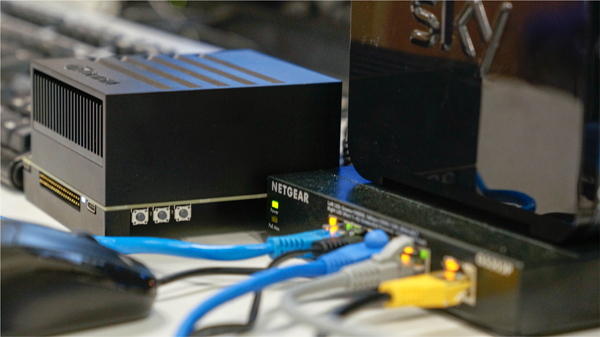 SONET A revelation in today´s mobile is networks is SON (Self-Organizing technology) technology, which is seen as a playing pivotal role towards reducing the management costs of networks. LSBU’s 5G SON testbed is capable of collecting information from the network, so as to perform self-configuration, self-optimization, self-healing and etc, so as to reduce the operation cost through less human involvement, and to optimize the service quality through robust and prompt network optimization.
SONET A revelation in today´s mobile is networks is SON (Self-Organizing technology) technology, which is seen as a playing pivotal role towards reducing the management costs of networks. LSBU’s 5G SON testbed is capable of collecting information from the network, so as to perform self-configuration, self-optimization, self-healing and etc, so as to reduce the operation cost through less human involvement, and to optimize the service quality through robust and prompt network optimization.
Innovate UK: |
|---|
 WaTCH objective is to improve the provisioning of smart surveillance (object detection, object racking, and face or text recognition) using edge computing from different types of cameras (for example, body-worn cameras, Smartphone cameras, city cameras and car recorders), IoT devices and vehicles, generating media analytics. Future Intelligence Ltd, leading SME, is already providing solutions for smart city and smart lighting and markets. This project will expand its solution portfolio with new capabilities and new featured products and services. On the other hand, London Southbank University will expand its academic leadership in advanced cloud infrastructures area.
WaTCH objective is to improve the provisioning of smart surveillance (object detection, object racking, and face or text recognition) using edge computing from different types of cameras (for example, body-worn cameras, Smartphone cameras, city cameras and car recorders), IoT devices and vehicles, generating media analytics. Future Intelligence Ltd, leading SME, is already providing solutions for smart city and smart lighting and markets. This project will expand its solution portfolio with new capabilities and new featured products and services. On the other hand, London Southbank University will expand its academic leadership in advanced cloud infrastructures area.
Past Projects
VICTORY: Secure VNF Service Management in 5G using Blockchain - Funding Body: Innovate UK, 2020.
CiProVoT (Civil Protection for Volunteers Training). Funded by: ERASMUS+ European Eunion Commision, KA2- “Cooperation for innovation and the exchange of good practices", Funding Body: Erasmus, 2019.


